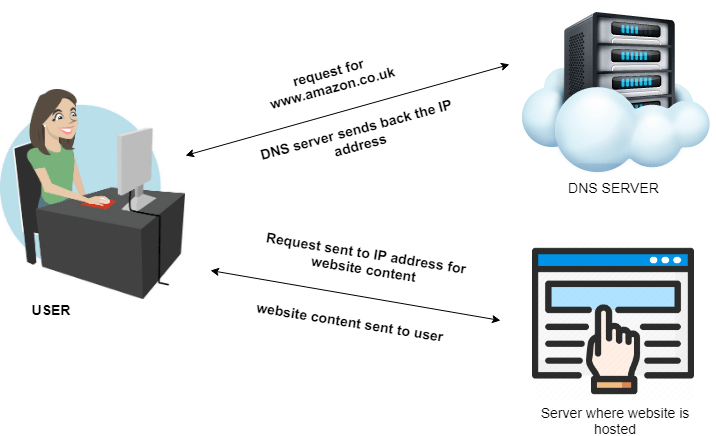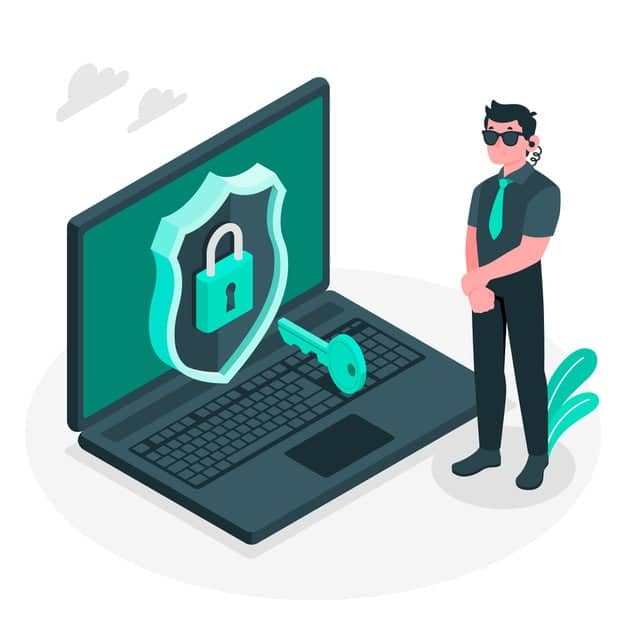When you first connect to the internet, your ISP DNS servers play a major role in your browsing journey, but first, what is a DNS server?
DNS stands for Domain Name System (server or service, all mean the same), and it serves the purpose of resolution of domain names to their respective servers’ IPs.
Intro
Think of the internet as a giant phonebook. For instance, when you type wevrlabs.net on your browser’s address bar, it is the equivalent of searching a contact on your phone, and when you dial it, your phone will then link that contact’s name to their phone number, this way you don’t have to remember all the phone numbers of your contacts.
The same logic applies to domain names, when you go to wevrlabs.net the request should be translated to the server IP address where the website is hosted (in this case 104.28.18.130), and that’s where the DNS server comes in, saving you from having to memorize the numeric format of thousands of IP addresses of the numerous websites you visit each day.

Now when you connect to the internet, your ISP (internet service provider) will probably assign a number of DNS servers for you, so to help in translating websites domain names to the server IPs where those websites are hosted.
You are probably thinking now, “that’s a good thing, so where’s the problem?”. Well, there are numerous disadvantages for relying on your ISP DNS servers while navigating the internet, and in this article, we explore some of them with a quick glance, and later on, we’ll publish another article to guide you through the steps of how to set an alternative and more reliable DNS service provider for a better experience.
Disadvantages of using ISP DNS servers:
Privacy, duh!

The number one reason is obvious here! when using your ISP DNS servers, you will be putting your entire web browsing history in the hands of your ISP for them to spy on you! Because believe it or not, some ISPs will sell this sensitive data to 3rd-parties in exchange for ads, etc, and some will go further by serving governments with this valuable data.
Plus, gosh! it’s just a frightening idea knowing someone else is sneaking in and observing almost every corner you go around the web!
But still, changing DNS servers won’t stop your ISP from tracking you, but it will just make it harder for them to follow your movements.
Disrupted Reliability
Using your ISP DNS servers may not give you a reliable and fast internet experience, because more often, your ISP DNS servers data stay outdated for a few weeks before getting refreshed, as they cache all DNS requests for a longer period in order to provide a faster DNS response.
However, this cached data my get outdated when a website changes their server IP more often for instance, and hence the old IPs will be unreachable, making you unable to browse that website sometimes.
If you are a website owner, you will more likely understand this point, when switching between hosts for example, even after updating your domain name servers, you’d still find yourself displaying the same old content from your previous host when trying to visit your website.
Plus, your ISP won’t probably invest much in maintaining their DNS servers with the highest and latest standards in the industry to provide lightning-fast responses, faster and quicker requests caching, etc, let’s just put this here!
Censorship
Now don’t get me all wrong here, censoring some content on the web is obviously for the better good, but sometimes, your ISP DNS servers may block access to some useful and resourceful websites on the internet for some reason or another (geo-blocked websites, music streaming services, etc). By using another DNS service, you will bypass some of your ISP DNS filters and unblock those websites.
Okay, how about all the bad websites that were booked for a good reason? Well, luckily most DNS services of which we will explore later in another article, provide you with an option to censor and block access to websites with harmful content, especially if you have kids who spend most of their time surfing the web (and that’s probably the case today, given this quarantine and lockdown).
Lower Security
Most ISP DNS servers do not have an up-to-date database with all the phishing and harmful websites out there that can trick you to install malware and viruses if you surf them. Luckily, free DNS providers such as OpenDNS, provide a database with most of the harmful websites and will scan your requests in realtime so that you will get alerted and blocked from accessing such harmful places while browsing the web.
Round-up
As we mentioned earlier, those are some of the most common reasons why you should consider using another DNS provider for serving your web browsing needs, in a later article this week, we will be taking a look at some of those providers and the advantages for each one. Also, we’ll learn how to modify DNS settings, whether on a phone, computer, or router.
Share with us your thoughts and opinions in the comments section below, and if you have any additional ideas you wish to highlight as well! We really love to hear your feedback :D!

